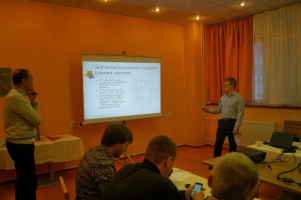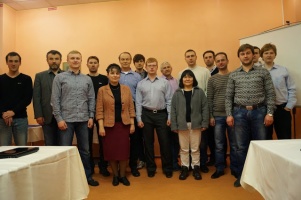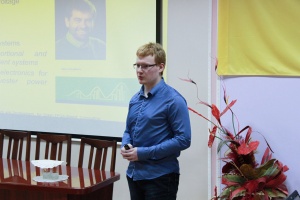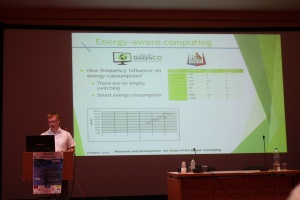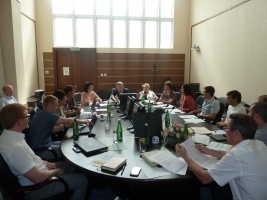Информация:Tempus — различия между версиями
Материал из Кафедра Автоматики и телемеханики
Kamenskih (обсуждение | вклад) (→Международная программа TEMPUS (Erasmus+)) |
|||
| (не показаны 22 промежуточные версии 2 участников) | |||
| Строка 1: | Строка 1: | ||
| − | == | + | ==Международная программа TEMPUS (Erasmus+)== |
| + | [[Файл:Tempus_logo_new.jpg|175px|мини|справа]] | ||
| − | ''' | + | '''[http://erasmusplusinrussia.ru/sample-page/ Национальный офис Erasmus+ в России]''' |
| − | |||
| − | + | '''[http://www.tempus-russia.ru/ Национальный офис TEMPUS в России]''' | |
| − | == | + | <div class="NavFrame collapsed" > |
| + | <div class="NavHead">О программе Erasmus+</div> | ||
| + | <div class="NavContent" style="text-align:left"> | ||
| + | Программа Erasmus+ — новая программа Европейского Союза, направленная на поддержку сотрудничества в области образования, профессионального обучения, молодежи и спорта на период с 2014 по 2020 гг. | ||
| − | + | Новая программа призвана стать эффективным инструментом содействия развитию человеческого и социального капитала в Европе и за ее пределами. В задачи Программы входит создание нового качества сотрудничества, включая: | |
| + | использование, распространение и развитие ранее достигнутых результатов | ||
| + | продвижение новых идей и привлечение новых участников из сферы труда и гражданского общества | ||
| + | создание и развитие новых форм сотрудничества | ||
| + | Программа интегрировала такие ранее действовавшие программы как: The LifeLong learning Programme, The Youth in Action programme, The Erasmus Mundus Programme, Alfa, Edulink, Tempus и другие. | ||
| − | : | + | В рамках сотрудничества в сфере высшего образования в Erasmus+ выделены следующие основные направления: |
| − | : | + | *'''Key Action 1''': Learning Mobility of Individuals — новые возможности мобильности для студентов и преподавателей |
| + | *'''Key Action 2''': Cooperation for innovation and good practice — сотрудничество для развития потенциала университетов и обмена лучшими практиками | ||
| + | а также <i>Jean Monnet Activities</i> — широкие возможности развития европейских исследований в рамках подпрограммы Jean Monnet. | ||
| − | + | <b>География </b> | |
| − | + | По сравнению с предыдущими программами ЕС в сфере образования, география Erasmus+ значительно расширилась. | |
| − | : | + | Erasmus+ охватывает так называемые «страны Программы», куда входят: |
| − | + | страны-члены Европейского Союза | |
| + | Исландия, Лихтенштейн, Норвегия, Бывшая Югославская Республика Македония, Турция | ||
| + | а также »страны-партнеры», поделенные на 13 географических регионов: | ||
| − | :* | + | *'''регион 1''' : Западные Балканы |
| + | *'''регион 2''': страны Восточного партнерства | ||
| + | *'''регион 3''': страны Южного Средиземноморья | ||
| + | *'''регион 4''': Российская Федерация (территория, признаваемая международным правом) | ||
| − | + | и <i>другие</i>, в т.ч. Центральная Азия, Латинская Америка, Африка, страны Карибского бассейна и др. | |
| − | + | ||
| − | + | </div> | |
| + | </div> | ||
| − | + | ==Международный проект TEMPUS GreenCo "Green Computing and Comunications" (530270-TEMPUS-1-2012-1-UK-TEMPUS-JPCR)== | |
| − | + | The name of project is GreenCo, which is acronym from official name “Green Computing and Comunications” (reference number 530270-TEMPUS-1-2012-1-UK-TEMPUS-JPCR). | |
| − | : | + | [[Файл:Логотип_проекта_GreenCo.jpg|мини|справа|200px|Green Computing & Communications]] |
| − | + | This project is financed by the TEMPUS programme, which encourages higher education institutions in the EU Member States and partner countries to engage in structured cooperation through the establishment of “consortia. | |
| − | |||
| − | + | '''Project Type''' | |
| − | + | Curriculum Reform, 3 years | |
| + | Specific Objective | ||
| − | + | * To introduce a Green Computing & Communications programme for master students in UA and RU universities; | |
| + | * To introduce a Green Computing & Communications programme for doctoral students in UA and RU universities; | ||
| + | * To facilitate intensive capacity building measures for UA and RU IT tutors; | ||
| + | * To establish two PhD incubators in UA and RU on Green Computing & Communications. | ||
| − | |||
| − | + | '''The project content and methodology''' | |
| + | To reach the wider objective of the project a master and doctoral degree program on Green Computing and Communications (GCC) for Ukrainian and Russian universities will be introduced. Through this master programme the close cooperation links between national R&D institutions and university systems in Ukraine and Russia will be spanned and high quality of education in a higher education system in GCC programs will be enhanced. | ||
| − | : | + | * WP1: Project Management - describes the working methodology adopted for effective coordination and management procedures: project Steering Committee tasks allocation, arrangement and hosting of coordination meetings, short summary of duties foe project coordination and local management teams in both partner countries. |
| + | * WP2: Development of GCC curricula for master students - The aim of this WP is to develop tailor made curricula for Master in GCC for 8 partner universities and 2 research institutes in Ukraine and Russia, in order to support a systematic approach to education and research in this very important topic. The development of the curricula will be based on knowledge transfer from EU partners, thus enabling development of European up-to-date curricula, in accordance with all current standards, including the Bologna process. This WP is closely connected with WP3, as the same processes, and where applicable same events will be used for reaching of project goals. WP4 is aimed at capacity building for the local staff working on this WP. Special attention will be paid to networking with other local stakeholders relevant for the topics, to ensure awareness rising and sustainability. | ||
| + | * WP3: Development of GCC curricula for doctoral students - The aim of this WP is to develop tailor made curricula for PhD in GCC for 8 partner universities and 2 research institutes in Ukraine and Russia, in order to support a systematic approach to education and research in this very important topic. The development of the curricula will be based on knowledge transfer from EU partners, thus enabling development of European up-to-date curricula, in accordance with all current standards, including the Bologna process. | ||
| + | * WP4: Capacity building for UA and RU PC’s tutors - describe the system for comprehensive training in the relevant theoretical, analytical and research skills needed to design and introduce the above modules to Ukrainian and Russian master/doctoral students. | ||
| + | * WP5: Establishment of two PhD incubators on GCC - describe the plan proposed for the networking with local stakeholders in regional and national levels, development of roadmap for establishment of PhD incubators, piloting PhD incubators and analysis of its results. | ||
| + | * WP6: Dissemination plan - includes the specific measures aimed on broad dissemination of main WPs outcomes and outputs by web-based communication mechanisms, as well as face-to-face meeting, launch events in both of the participating partner countries, networking and final dissemination conference to be hosted by key Ukrainian partner – KhAI. | ||
| + | * WP7: Sustainability plan - summary of the activities aimed at strengthening the institutional and financial sustainability, attracting the external funding after the finishing of eligibility period. | ||
| + | * WP8: Quality control actions - present the actions taken by project team for assessment and assurance of quality control of main WP: financial and technical reports, activity reports, QA by project coordinator and local teams, feedbacks from target groups of project beneficiaries and other project teams by using inter-project coaching service. | ||
| + | '''Teaching programmes''' | ||
| − | '''[http:// | + | Target MSc and PhD programmes are intended for IT bachelor graduates to gain an understanding of the green computing methodologies and paradigms, energy efficient system level software such as compilers, hypervisors, monitoring and profiling tools, workload managers, and programming environments, energy aware large scale distributed systems, such as Grids and Clouds. It is suitable for those aspiring to be software developers, software architecture designers, FPGA developers, experts on distributed infrastructures. |
| + | |||
| + | Each of the modules consists of 3 chapters, where their content reflects the theoretical and practical knowledge used technologies for GCC and R&D for green FPGA-Based Computing/ Wireless-Based Computing and Communication/ IT-Infrastructures/ Smart Energy Infrastructures. | ||
| + | |||
| + | The main indicator is that all partner universities have developed at least one tailor made curriculum master/doctoral module successfully and with all planned components and introduced all master/doctoral modules before the end of the project. | ||
| + | |||
| + | |||
| + | '''[http://my-greenco.eu/ Страница международного проекта TEMPUS GreenCo "Green Computing and Comunication]''' | ||
== Галерея == | == Галерея == | ||
<gallery perrow=3 widths="420px" heights="200px"> | <gallery perrow=3 widths="420px" heights="200px"> | ||
| − | Файл: | + | Файл:Tempus_Выступление.JPG|Выступление с докладом "Green-Logic" на международном семинаре GreenWins-2014, г.Жилина, Словакия. |
| − | Файл: | + | Файл:Tempus_Коллектив.JPG|Коллективное фото участников международного семинара GreenWins-2014. |
| − | Файл: | + | Файл:Tempus_Каменских.jpg|Доклад “A self-timed Green Computing” на международной зимней школе-семинаре Tempus WINT-15 в г. Ужгород, Украина |
| − | Файл: | + | Файл:Tempus_Доклад.JPG|Доклад “The analysis of energy-aware and naturally reliable digital devices designs” на конференции PACET-2015 Ioanina, Greece |
| − | Файл: | + | Файл: Tempus Мониторинг.JPG| Мониторинг Российских участников проекта в г.Ставрополь |
</gallery> | </gallery> | ||
__NOTITLE__ __NOTOC__ | __NOTITLE__ __NOTOC__ | ||
Текущая версия на 19:03, 1 октября 2015
Международная программа TEMPUS (Erasmus+)
Национальный офис Erasmus+ в России
Национальный офис TEMPUS в России
Программа Erasmus+ — новая программа Европейского Союза, направленная на поддержку сотрудничества в области образования, профессионального обучения, молодежи и спорта на период с 2014 по 2020 гг.
Новая программа призвана стать эффективным инструментом содействия развитию человеческого и социального капитала в Европе и за ее пределами. В задачи Программы входит создание нового качества сотрудничества, включая:
использование, распространение и развитие ранее достигнутых результатов продвижение новых идей и привлечение новых участников из сферы труда и гражданского общества создание и развитие новых форм сотрудничества Программа интегрировала такие ранее действовавшие программы как: The LifeLong learning Programme, The Youth in Action programme, The Erasmus Mundus Programme, Alfa, Edulink, Tempus и другие.
В рамках сотрудничества в сфере высшего образования в Erasmus+ выделены следующие основные направления:
- Key Action 1: Learning Mobility of Individuals — новые возможности мобильности для студентов и преподавателей
- Key Action 2: Cooperation for innovation and good practice — сотрудничество для развития потенциала университетов и обмена лучшими практиками
а также Jean Monnet Activities — широкие возможности развития европейских исследований в рамках подпрограммы Jean Monnet.
География
По сравнению с предыдущими программами ЕС в сфере образования, география Erasmus+ значительно расширилась.
Erasmus+ охватывает так называемые «страны Программы», куда входят:
страны-члены Европейского Союза Исландия, Лихтенштейн, Норвегия, Бывшая Югославская Республика Македония, Турция а также »страны-партнеры», поделенные на 13 географических регионов:
- регион 1 : Западные Балканы
- регион 2: страны Восточного партнерства
- регион 3: страны Южного Средиземноморья
- регион 4: Российская Федерация (территория, признаваемая международным правом)
и другие, в т.ч. Центральная Азия, Латинская Америка, Африка, страны Карибского бассейна и др.
Международный проект TEMPUS GreenCo "Green Computing and Comunications" (530270-TEMPUS-1-2012-1-UK-TEMPUS-JPCR)
The name of project is GreenCo, which is acronym from official name “Green Computing and Comunications” (reference number 530270-TEMPUS-1-2012-1-UK-TEMPUS-JPCR).
This project is financed by the TEMPUS programme, which encourages higher education institutions in the EU Member States and partner countries to engage in structured cooperation through the establishment of “consortia.
Project Type
Curriculum Reform, 3 years Specific Objective
- To introduce a Green Computing & Communications programme for master students in UA and RU universities;
- To introduce a Green Computing & Communications programme for doctoral students in UA and RU universities;
- To facilitate intensive capacity building measures for UA and RU IT tutors;
- To establish two PhD incubators in UA and RU on Green Computing & Communications.
The project content and methodology
To reach the wider objective of the project a master and doctoral degree program on Green Computing and Communications (GCC) for Ukrainian and Russian universities will be introduced. Through this master programme the close cooperation links between national R&D institutions and university systems in Ukraine and Russia will be spanned and high quality of education in a higher education system in GCC programs will be enhanced.
- WP1: Project Management - describes the working methodology adopted for effective coordination and management procedures: project Steering Committee tasks allocation, arrangement and hosting of coordination meetings, short summary of duties foe project coordination and local management teams in both partner countries.
- WP2: Development of GCC curricula for master students - The aim of this WP is to develop tailor made curricula for Master in GCC for 8 partner universities and 2 research institutes in Ukraine and Russia, in order to support a systematic approach to education and research in this very important topic. The development of the curricula will be based on knowledge transfer from EU partners, thus enabling development of European up-to-date curricula, in accordance with all current standards, including the Bologna process. This WP is closely connected with WP3, as the same processes, and where applicable same events will be used for reaching of project goals. WP4 is aimed at capacity building for the local staff working on this WP. Special attention will be paid to networking with other local stakeholders relevant for the topics, to ensure awareness rising and sustainability.
- WP3: Development of GCC curricula for doctoral students - The aim of this WP is to develop tailor made curricula for PhD in GCC for 8 partner universities and 2 research institutes in Ukraine and Russia, in order to support a systematic approach to education and research in this very important topic. The development of the curricula will be based on knowledge transfer from EU partners, thus enabling development of European up-to-date curricula, in accordance with all current standards, including the Bologna process.
- WP4: Capacity building for UA and RU PC’s tutors - describe the system for comprehensive training in the relevant theoretical, analytical and research skills needed to design and introduce the above modules to Ukrainian and Russian master/doctoral students.
- WP5: Establishment of two PhD incubators on GCC - describe the plan proposed for the networking with local stakeholders in regional and national levels, development of roadmap for establishment of PhD incubators, piloting PhD incubators and analysis of its results.
- WP6: Dissemination plan - includes the specific measures aimed on broad dissemination of main WPs outcomes and outputs by web-based communication mechanisms, as well as face-to-face meeting, launch events in both of the participating partner countries, networking and final dissemination conference to be hosted by key Ukrainian partner – KhAI.
- WP7: Sustainability plan - summary of the activities aimed at strengthening the institutional and financial sustainability, attracting the external funding after the finishing of eligibility period.
- WP8: Quality control actions - present the actions taken by project team for assessment and assurance of quality control of main WP: financial and technical reports, activity reports, QA by project coordinator and local teams, feedbacks from target groups of project beneficiaries and other project teams by using inter-project coaching service.
Teaching programmes
Target MSc and PhD programmes are intended for IT bachelor graduates to gain an understanding of the green computing methodologies and paradigms, energy efficient system level software such as compilers, hypervisors, monitoring and profiling tools, workload managers, and programming environments, energy aware large scale distributed systems, such as Grids and Clouds. It is suitable for those aspiring to be software developers, software architecture designers, FPGA developers, experts on distributed infrastructures.
Each of the modules consists of 3 chapters, where their content reflects the theoretical and practical knowledge used technologies for GCC and R&D for green FPGA-Based Computing/ Wireless-Based Computing and Communication/ IT-Infrastructures/ Smart Energy Infrastructures.
The main indicator is that all partner universities have developed at least one tailor made curriculum master/doctoral module successfully and with all planned components and introduced all master/doctoral modules before the end of the project.
Страница международного проекта TEMPUS GreenCo "Green Computing and Comunication
Галерея
Выступление с докладом "Green-Logic" на международном семинаре GreenWins-2014, г.Жилина, Словакия.
Коллективное фото участников международного семинара GreenWins-2014.

